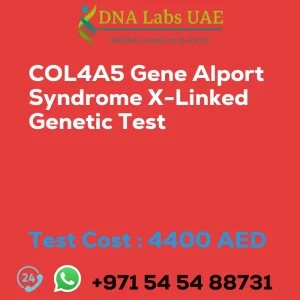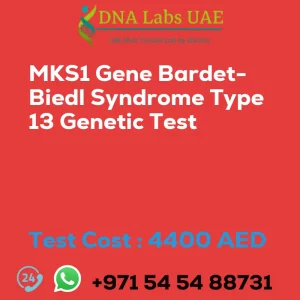Atypical Hemolytic Uremic Syndrome Panel NGS Genetic Test
Atypical hemolytic uremic syndrome (aHUS) is a rare and life-threatening disorder that affects the kidneys and other organs. DNA Labs UAE offers the Atypical Hemolytic Uremic Syndrome Panel NGS Genetic Test to diagnose this condition and guide treatment decisions.
Test Details
The Atypical Hemolytic Uremic Syndrome Panel NGS Genetic DNA Test is a diagnostic test that uses next-generation sequencing (NGS) technology to analyze a patient’s DNA for genetic mutations associated with aHUS. This highly sensitive and specific test analyzes multiple genes, including complement factor H (CFH), complement factor I (CFI), complement factor B (CFB), complement component 3 (C3), and thrombomodulin (THBD), which play a critical role in regulating the complement system.
Cost and Sample Condition
The cost of the Atypical Hemolytic Uremic Syndrome Panel NGS Genetic Test is AED 4400.0. The test requires a blood sample, extracted DNA, or one drop of blood on an FTA card.
Report Delivery and Method
The report for the Atypical Hemolytic Uremic Syndrome Panel NGS Genetic Test is typically delivered within 3 to 4 weeks. The test utilizes NGS technology for accurate and comprehensive analysis.
Test Type and Test Department
The Atypical Hemolytic Uremic Syndrome Panel NGS Genetic Test falls under the category of Hepatology Nephrology Endocrinology Disorders. It is conducted by general physicians in the Genetics department.
Pre Test Information
Prior to undergoing the Atypical Hemolytic Uremic Syndrome Panel NGS Genetic Test, it is important to provide the clinical history of the patient. Additionally, a genetic counseling session may be conducted to draw a pedigree chart of family members affected by ADAMTS13, C3, CD46, CD59, CFB, CFH, CFHR1, CFHR2, CFHR3, CFHR5, CFI, CR1, CR2, DGKE, INF2, MMACHC, MMUT, PIGA, PLG, and THBD.
Conclusion
The Atypical Hemolytic Uremic Syndrome Panel NGS Genetic Test offered by DNA Labs UAE is a crucial tool for the diagnosis and management of aHUS. By detecting genetic mutations accurately, this test allows for earlier diagnosis and more targeted treatment, ultimately improving patient outcomes. It can also identify family members who may be at risk of developing aHUS, enabling preventive measures.
| Test Name | Atypical hemolytic uremic syndrome Panel NGS Genetic DNA Test |
|---|---|
| Components | |
| Price | 4400.0 AED |
| Sample Condition | Blood or Extracted DNA or One drop Blood on FTA Card |
| Report Delivery | 3 to 4 Weeks |
| Method | NGS Technology |
| Test type | Hepatology Nephrology Endocrinology Disorders |
| Doctor | General Physician |
| Test Department: | Genetics |
| Pre Test Information | Clinical History of Patient who is going for Atypical hemolytic uremic syndrome Panel NGS Genetic DNA Test. A Genetic Counselling session to draw a pedigree chart of family members affected with ADAMTS13, C3, CD46, CD59, CFB, CFH, CFHR1, CFHR2, CFHR3, CFHR5, CFI, CR1, CR2, DGKE, INF2, MMACHC, MMUT, PIGA, PLG, THBD |
| Test Details |
Atypical hemolytic uremic syndrome (aHUS) panel NGS genetic DNA test is a diagnostic test that uses next-generation sequencing (NGS) technology to analyze a patient’s DNA for genetic mutations associated with aHUS. aHUS is a rare and life-threatening disorder that affects the kidneys and other organs. It is caused by mutations in genes that regulate the complement system, which is part of the immune system that helps to fight infections. The aHUS panel NGS genetic DNA test analyzes multiple genes associated with aHUS, including complement factor H (CFH), complement factor I (CFI), complement factor B (CFB), complement component 3 (C3), and thrombomodulin (THBD). These genes play a critical role in regulating the complement system and mutations in any of these genes can lead to uncontrolled activation of the complement system, resulting in damage to the kidneys and other organs. The aHUS panel NGS genetic DNA test is a highly sensitive and specific test that can detect mutations in these genes with a high degree of accuracy. This test can help to confirm a diagnosis of aHUS and guide treatment decisions. It can also be used to identify family members who may be at risk of developing aHUS due to a genetic mutation. Overall, the aHUS panel NGS genetic DNA test is an important tool for the diagnosis and management of aHUS. It can help to improve patient outcomes by allowing for earlier diagnosis and more targeted treatment. |






